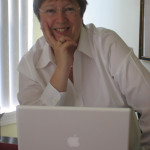On Monday, The Bookseller, the trade magazine for the UK publishing industry, ran a one-day conference called Author Day (“It's time for authors to have their day”).
That writers agree with that sentiment was evidenced by the social media response, which saw the hashtag #AuthorDay trending on Twitter, and many writers misunderstanding, saying how wonderful that authors now have their own day, wishing each other “Happy Author Day”, and even making up backstory about how the date got chosen (because it was the last day of Nanowrimo, according to these wonderfully imaginative scribes).
Meanwhile, back at actual Author Day, the conference sales page had extended “a warm welcome to both independent and traditionally published authors, as well as to their agents and publishers” but the agents and publishers largely failed to show, unless they were speaking. And most of those (with some honourable exceptions e.g. Sheila Crowley of Curtis Brown) left as soon as their gig was over, and displayed little interest in hearing from authors.
The intention behind the Author Day, as well as being a plea for unity across a divided industry, was to present key findings at the upcoming FutureBook Conference.
So after the event, ALLi wrote to author members who were in attendance and asked for feedback, in the following way: “We're putting together a blog post for tomorrow, which we will feed into Futurebook's recommendation engine. So would very much like your feedback on the day, if you have a moment, in this format: 1. Top Commendation (what Author Day did best); 2. Top Recommendation (What you'd like to see next time). 3. Message to the publishing industry from indie authors. Please be completely honest.”
So first, my own answers to those questions:
Commendation: For me, the sentiment that fired the day, different from the usual How-To writers’ conferences, was most interesting. “Now is the time for authors, publishers and the book trade to come together, share ideas and move from discussion to action. Our emphasis is on exploring potentially divisive issues— with a goal of common understanding.” These are the words, I believe, of Porter Anderson who was, as always, a formidable organiser, thoughtful programmer and genial host. And there were some great speakers, excellently facilitated.
Recommendation: If “authors, publishers and the book trade [are] to come together, share ideas and move from discussion to action”, we need to have publishers and the book trade in the room (not just on stage), and formats that facilitate engagement and exchange. Exchange between trade-and indie-published authors, yes, but also between trade-publishers and the self-publishing services who sponsored the day, and from whom the trade could learn much about business models that respect authors and offer decent terms: fair revenues, non-exclusivity, limited rights, easy reversion … and so on. I would also like to see discussions that have more relevance for indie authors and that focus more on the myriad of options for authors now.
My Message to the Publishing Industry from Indie Authors: The empowerment of authors through new technologies and tools is good for writers and readers — and what is good for writers and readers is good for publishing too (not to mention literary culture), though it might not feel like that to you right now. Please do what you can to improve your company's treatment of authors. It’s in everyone’s interest.
We blog this feedback in the spirit of open debate which Author Day called for, and we'd like to hear your opinions too. Do join in and tell us what you think of the ideas ignited by the day — including your message to the trade publishing industry — in the comments below.
We'll pass it on.
JESSICA BELL, WRITES FICTION POETRY & AUTHOR GUIDES
Commendation: Great that all the talks and panels ran on one after the other so that we were able to attend them all and to get all publishing types together and communicating in a comfortable environment.
Recommendation: It would be great to allow the audience to contribute to the panel discussions. I often had questions/contributions that I was unable to express because I was expected to just listen. And writing my comments down to ask panelists at the end does not benefit all in attendance, as people leave.
My Message to the Publishing Industry: The traditional production and marketing method is just another vehicle for us to reach our goals and does not define the indie author. Versatility, open-mindedness, determination, and the courage to take risks both big and small, is what makes us indie.
 JANE DAVIS, WRITES LITERARY FICTION
JANE DAVIS, WRITES LITERARY FICTION
Commendation: The speakers were good. It was a great pleasure to hear Kamila Shamsie speak again. It was acknowledged what hard work self-publishing is and what a vast range of skills are required to do it well. There was plenty of reassurance that the grass is not greener in the world of trad publishing. It rather felt like a celebration of ALLi authors.
Recommendation: The content was good, but almost nothing new [and much of it] felt irrelevant to me (e.g. how some trade publishers' in-house software is failing them). As Nikesh said, we shouldn’t be here talking about the same issues year after year. Some of the things that the trad authors were getting het up about were totally irrelevant to me. An annual feedback form [from trad authors to their publishers] was hailed as a great idea, but really, who could say that it is a bad idea – and who will really reply honestly if it is introduced?
The question asked of attendees was how can authors take collective action to make the industry change? But the truth is that:
- Trad authors have been taking collective action and it has yet to result in change (Joanne Harris led a delegation to the House of Commons last summer), so it is a case of keeping things on the agenda and maintaining pressure. Nicola Solomon is a superb spokesperson for the cause (although, again, she was saying the same thing that I have seen her say several times before).
- Indie authors may well have interest in the health of trade publishing, but we don’t have the same level of interest. Trade publishing is a club I was once a member of (if Andrew Lownie’s predictions are correct, it will become an even more exclusive club. Or it could be that trad publishing will remain the same size and indie and assisted publishing will grow). My prime concerns are not about contract terms, or reversion clauses, but how I can convince bookshops that my books are of sufficient quality to be stocked, and how I can get my books in front of more readers. These were not addressed.
Our common interests are areas such as copyright and keeping reading on the agenda.
My Message to the Publishing Industry from Indie Authors: There was a cry for diversity of voices in fiction, but this IS being addressed. For every bad example cited, there are plenty of good examples. I attended an event last Saturday night organised by Word Factory and all three authors were gay, writing about gay relationships, for example. No one mentioned Marlon James winning the Booker… or that in 2014/2015 women featured very highly in awards nominations and prize lists…or that the diverse voices are finding a home with indie. OK, I know it’s not enough, but neither is it nothing. If we make a statement when a shortlist for an award is made up of books by six white men, then we must also acknowledge the progress that has been made.
 EDITOR CARLA DOUGLAS, WRITES AUTHOR GUIDES
EDITOR CARLA DOUGLAS, WRITES AUTHOR GUIDES
Commendation: Bringingauthors together from both sides of this divide — in a spirit of real collegiality — is an enormous accomplishment in itself. By providing this space for discussion, Author Day opened a window — if only just a crack — to a view of what might be ahead as publishing evolves: more collaboration, less rancour.
Recommendation: Some panelists (Kate Pullinger, Dave Morris) touched on this, but all sides in the discussion would learn something from a closer look at what reading means in the 21st century, what is the value of reading, and, as Kamila Shamsie put it, what is the value of a book.
Message to Publishing From An Indie Editor: Keep an eye on your rear-view mirror.
 CLARE FLYNN, WRITES HISTORICAL FICTION:
CLARE FLYNN, WRITES HISTORICAL FICTION:
Commendation: The venue, catering, etc was great. Lots of opportunity to network and catch up with author friends/ make new ones. Most of the speakers were very good – especially OrnaRoss, Nicola Solomon, Jane Steen, Kamila Shamsie, Emma Barnes and Cathy Rentzenbrink.
Recommendation: It was too much of a one-way street so it felt like being in a lecture theatre all day and being lectured at, with no tutorials! I would have liked it to be much more participatory, with breakout groups and more interactivity. The final session was too little too late and felt random and unfocused.
The day also reinforced some of the very issues it raised. There was a strong feeling coming from the authors in the room that publishers don’t listen to or care about the feedback of authors – and the only two publishing representatives speaking (Rebecca Smart and Sara Lloyd) were in “transmit” mode: here’s all the fabulous marketing stuff we do (yawn).
[I find] the idea of taking back some kind of collective message to the publishing industry on Friday, frankly, patronising: “Here’s what the kids said about you while you weren’t there”.
My Message to the Publishing Industry from Indie Authors: You are becoming increasingly irrelevant.
TIMOTHY MICHAEL LEWIS, WRITES SCI-FI
Commendation: I really enjoyed Author Day. I guess a lot of that was meeting a lot of other indie authors – and that there was just the right ratio in terms of trad/indie authors in the event.
Recommendation: I'm not sure Porter's hopes of some grand truce in the trad-indie wars were that assisted by it but it was a good first step.
My Message to the Publishing Industry from Indie Authors: You need to stop milking eBook revenues off your authors, because if you don't, you will just see a death by a thousand defections to indie publishing. Trade publishing does work for selling paper booksto bookstores but you are exploiting authors in terms of eBooks.
KAREN INGLIS, WRITES CHILDREN'S BOOKS:
Commendation: It put traditional and self-pub authors in the same room! This gave both sides the opportunity to understand each others’ experiences and what they were missing (or not missing!)
Recommendation: More publishers there — not just the sponsors — and who stay for the duration. Also more movers and shakers who act as ‘gatekeepers’ in other ways — eg book review journalists, awards or litfest organisers – to join in the conversation and take questions. This matters because:
- From the traditionally published author perspective, publisher presence would show a commitment to traditionally published authors as valued customers in their own right rather than suppliers who often seem to be ignored or left out of key conversations about their work, sales etc. We needed to see publishers address questions from authors about information sharing, royalty payments, involving them in marketing decisions and so on — and to show respect for trad published authors by committing to develop a ‘treating authors fairly’ charter to which authors can refer and against which they can hold publishers to account.
- From the indie author perspective more publisher and other movers and shakers' presence was needed to join in the discussion about how the industry as a whole needs to acknowledge that there are more quality authors in existence than there are publishers who can take their work and that as a result the decision of authors to go the indie route using the new tools that make this possible is one that is (a) inevitable (who in their right mind wouldn’t do this?) and (b) should be applauded and respected.
We are all moving with the times. Part of this discussion could have included publishing houses and the wider literary establishment saying what they think an independent author needs to do to gain the acceptance and respect of influencers. Of course the answer will be use editors, professionals etc and many will be doing it already through ALLi….but there is most likely an assumption that this isn’t happening, and the author day would be an opportunity to educate in that respect and try to close the ‘us and them’ divide.
My Message to the Publishing Industry from Indie Authors: The world has changed, let’s work together to make the most of it. That means mutual respect and helping each other by sharing know-how. Many indies are doing this already, just look at what’s out there for free from indies on the internet which any trad author, or publishing house, can take advantage of. In return you tell us what you think we’re not yet doing to earn your respect and give us the tools to do this. (You may find we’re doing it already — but you may have even better tools and resources that we can make use of).
JJ MARSH, WRITES DETECTIVE FICTION
Commendation: Informative, positive and wide-ranging. Pleasantly surprised not to be treated as a captive audience to a bunch of service providers. Well-structured day with a logical progression .
Recommendation: More practical (advanced) advice and input from other areas of the process from author to reader. Include rights lawyers, bookshop chains, litfest organisers, PR companies and even bookclubs to share their opinions.
My Message to the Publishing Industry from Indie Authors: Indie authors are diverse, eclectic, varied, vibrant and the antithesis of “the same, but different”. A cooperative, inclusive approach can only enrich the publishing landscape for all of us.
ROHAN QUINE, WRITES LITERARY FICTION
Commendation: The spirit, thoughtfulness and intentions of the day's programming.
Recommendation + My Message to the Publishing Industry from Indie Authors: My top recommendation for next year is essentially the same as my message to the publishing industry, so I'll conflate the two here: it would be for a more energetic and deliberate exploration of how the exciting new opportunities of this digital dynamic are affecting the literary side of the industry's output, and how they can be made to become a lot more successful in serving and preserving that side.
The tenor and subtext of almost all industry discussions of the kind enabled by Author Day tend to become reflections and enablements of the most commercial published content… I'm aware publishing is a commercially-driven industry, but it's also a cultural one; and although its cultural aspirations continue to be present in many of its individual players, nonetheless those rich and venerable cultural aspirations need relentless safeguarding, now more than ever. Because AuthorDay is not a trade fair but a conference, it can afford to make sure it takes proactive steps to advance that safeguarding — in just the same way as it did succeed in taking laudable steps to safeguard other issues that need and deserve such safeguarding, through its panel on race/gender and other allied interests. If the digital dynamic ends up eroding and diluting the richness of our literary culture, as it's more than powerful enough to do if market forces are left in charge of it, then we'll all be the poorer.
 JOANNA PENN, WRITES THRILLERS:
JOANNA PENN, WRITES THRILLERS:
Recommendation: Overall, it felt like the event was aimed at creating a press release/article for the FutureBook audience and publishing industry, not on giving value or actionable advice to authors. I left at lunchtime because I didn't feel I was getting any value out of it.
If an event is aimed at authors, it should deliver value for authors: education on what is working for authors right now, rather than exhortations for the industry to change.
e.g.
- Nicola Solomon's talk could have been on how to get your rights back, not on that it is needed in general
- Orna's could have been on how to get started in self-publishing, not on the state of the indie
- Khamila's could have been on how to find an editor that does care for the long term, or how to work with editors in general
- Rebecca Smart's could have been on how best to work with publishers
There was also nothing on the “future” for authors. It seemed old school with no recent updates e.g. no mention of AuthorEarnings.com, no mention even of audio, of global sales, no mention of Amazon, Kobo and other non-trad publishers, who were actually in the room.
My Message to the Publishing Industry from Indie Authors: Author Day underscored my feeling that indies are working in the “shadow” industry, a term first coined by Joe Konrath I think, because the event demonstrated that the people involved seem to have no clue about what's going on in the author space.
JANE STEEN, WRITES HISTORICAL FICTION
Commendation: I loved the genuine attempt to draw in all kinds of voices in publishing and to get them all talking to each other.
Recommendation: Next year I'd like to hear from traditionally published authors, of differing levels of critical and financial success, who are happy with the way things are. I'd like to know what's working for them.
My Message to the Publishing Industry from Indie Authors: it worried me that publishers/agents had difficulty recognizing themselves in the critical comments directed against them, and avoided acknowledging or pledging to deal with the serious concerns of some of their own authors who had grievances over delayed payments, discounting etc. These are the attitudes that drive more and more trade authors toward self-publishing.
I'm proud to be an indie author and think it's the best solution for many authors, but I don't want trade publishing to disappear–they do some things extremely well. They've *got* to address author grievances if they don't want to find themselves, as one agent predicted, publishing only ten percent of author output. They've got to stop shooting themselves in the foot!
 DEBBIE YOUNG, WRITES SHORT FICTION & AUTHOR GUIDES:
DEBBIE YOUNG, WRITES SHORT FICTION & AUTHOR GUIDES:
Commendation: The event enabled authors of all kinds to mingle without an obvious label of trade or indie ( no differentiation on the badges). The atmosphere of positive and constructive thinking was well established by Porter from the outset, and I liked his parallel of the Truth and Reconciliation Committee, which implied it as long overdue, with much to forgive, but a positive spirit drawing a line under what had gone before.
I also really liked the statement quite late in the day that one of the panellists actually liked and respected authors, a sentiment not in sufficient evidence most of the time. (I think it was Matthew Clayton from Unbound who said authors make his day and he learns so much from them.)
Recommendation: More engagement from publishers, who I felt were underrepresented on the panels and also unwilling to have a two-way discussion. They were protected from questions from the floor on the basis that there would be discussion at the end but they had all disappeared by then. The Penguin lady seemed especially defensive and on edge, possibly rattled by earlier allusions to Author Solutions,which had diplomatically not been named, but we all who knew who they meant. There were therefore no real answers given to some very critical questions such as speed, value and openness of author payment. This came across as rather disrespectful., and suggested they have no desire to change or negotiate. On their heads be it and those heads are buried in the sand. I would also like to see a PR person who had something positive to offer including practical success stories.
My Message to the Publishing Industry from Indie Authors: You need to up your game and improve your attitude towards authors, illustrators and translators and put them at the centre of your plans, rather than treating them as a tiresome but necessary essential, like health and safety laws which everyone hates, but without which no-one is allowed to operate.The increasing ease with which authors may self-publish and the spread of understanding (and erosion of misconceptions put about by the trade to deter authors from going indie) are much bigger threats to publishers' long-term future than competition for leisure time from TV and videogames. Do not underestimate the intelligence or self-respect of authors, who have been bullied and emotionally blackmailed for too long.
DAN HOLLOWAY, WRITES POETRY, FICTION & NONFICTION:
And, finally, a message from one author who was observing from outside, through the tweets and social interaction that was happening online during Author Day.
Commendation (What #AuthorDay Did Best): Great panel on diversity
Recommendation (What I'd like to See Next Time): Need more — um — authors.
My Message to the Publishing Industry from Indie Authors: The programme felt like it was designed to talk to and about writers, not to listen to them and engage with them. I was particularly troubled by the call for unity, which raises obvious questions: “on whose terms?”, “in what sense?” and “for what?” It would be all too easy for a call for unity to be used as a means to shut down exactly the kind of diversity of which there was an ostensible call for more!
We blog this feedback in the spirit of open debate which Author Day called for, and we'd like to hear your opinions too. Do join in and tell us what you think of the ideas ignited by the day — including your message to the trade publishing industry — in the comments below.
We'll pass it on.










[…] If trade publishing wants to attract independent-minded, hardworking writers, it will need to offer terms that are far better than those on the table at the moment. (See Indie Author Feedback on this here) […]
[…] the intro I talk about The Bookseller #authorday and the responses from the author community, the latest AuthorEarnings report about amazon.co.uk, the Smashwords 2015 author survey results […]
Thank you to everyone who was there and shared their experience thoughts. I read through parts of the twitter stream after the fact and thought there were several interesting bits and pieces.
As an indie I see significant value in an agent and would love to have representation, when I’m ready. I see far less value in publishers, are we interested in keeping them around so that the industry doesn’t collapse?
I love Jane Steen’s comment above that she is a small business owner and not a revolutionary. We don’t have to be a shadow industry to Trade Publishing, but if they are smart enough for us to desperately want their approval then it’s past time they learned to listen to the complaints of those that are fleeing their ranks.
Being professional and taking ourselves seriously as writers is the best thing we can do for other indies. We’ve gained a lot of respect in the last five years or so–let’s keep up the good work!
Just the mere mention of “Author Day ” gives value to the cause of writing, which every author should find to be of significance.
There may have been some misgivings here and there. But this necessitates improvements in the future events. I suppose even the United Nations Assembly had its own humble beginnings, but is now internationally recognized as having some meaning in promoting communication among nations.
My own desire is that this Day be upgraded to become an International event. Such a status will even enhance quality in the writing industry, as even the would-be writers would be encouraged to see value in it.
We have to bear in mind that all civilizations in the world are based on authors; like the Shakespears Lernado da Vincis and others.
The Author Day, as an international annual event will remind all and sundry the importance of writing and bring more authors in the limelight.
Despite its problems, I felt the conference was a good start.
In India:
The Ugly: In India, trade publishers and bookstores don’t even acknowledge that indie authors exist. Except when they are trying to sell us exorbitant services. Scarily enough, bookstores are jumping onto the vanity publishing bandwagon, offering to ‘publish’ authors and place them in their stores for a period of three months. The various ‘packages’ can run into thousands of dollars.
The Bad: Literary awards and prizes do not accept submissions from Indies.
The Good: One startup I know is working with distributors to give Indies access to bookstores. This is a great start, IMO.
For all the ways in which it didn’t satisfy everyone, though, I have to say that I couldn’t have imagined an event like Author Day back in 2007 when I started getting interested in the publishing industry. Back then agents were treated like superstars, self-publishing was vanity publishing and hardly anyone did it, standard advice was to write for the market and dumb it down. I’m sure authors back then had just as many issues with publishing as they do now, but they didn’t talk about them all that much. However patchy the dialogue is right now, it is at least a start.
Jane, I agree, this is indeed progress. It was nice to meet you too! Helenax
I’m sorry I didn’t get time to contribute (I was at the AuthorDay), but all the points I wanted to raise have been covered by the other ALLi authors above.
I felt the venue, speakers & food was great. It was an excellent idea to bring all authors together with the few publishers who turned up and agents and other industry people, but I also wanted to comment during the panel discussions, not after. I didn’t like being called ‘an industry disruptor’ even though I know this is an expression used in business and often positively.
The free discussion at the end of the day regarding relationship between trad published authors and publishers made me thank my lucky stars that I am an Indie. But I also felt I had nothing to contribute to this discussion apart from to say, ‘If you’re unhappy vote with your feet and go Indie!’
My recommendation to the industry: Traditional publishing can learn from the indies to change their business models and relationships with authors. The industry has already changed, especially attitudes amongst the agents, but we need to unite and forget about the labels ‘Trad’ and ‘Indie’. The readers do not care, so why should the writers, publishers and agents?
if I have anything to add, it is that I think, generally speaking, indie authors (and ALLi members in particular) are far better informed about the industry than our trad published counterparts who ‘want to concentrate on the writing’ (I am not knocking this attitude, in fact I would love to be in this position myself). This makes me think that the same frustrations will be there at future events. Our starting point insofar as knowledge is concerned is simply so much higher.
Having been traditionally published (non-fiction) and indie published (first novel) there is little difference in the marketing. I worked just as hard with the trad-published book as I do with the indie one. The trad publisher only started marketing a month before publication, even when I kept worrying and nagging. Every article I’ve ever read says to start 5-6 months ahead, longer for some periodicals. It was very frustrating and had a hugely detrimental effect on sales. I was never wild about the cover either.
However, With the self-published book it was so exciting to be in control of everything, down to the colour and quality of the paper, font, size of book, cover – the lot. But always at the back of my mind is a little voice that whispers, ‘The book is super and beautifully presented – probably heaps better than a trad published book, but it still doesn’t carry quite the cachet, even though it’s won the BRAG Medallion award for excellence.’ And I always feel I have to explain if a member of the public asks who my publisher is – which they do frequently.
So not sure what my real feelings are.
As far as the Author Day, it was disappointing not to see more agents and editors and publishers, particularly publishers. They should have been there throughout the whole day and listening to the authors who had very genuine complaints, many of whom are working hard for a laughable reward by a trad publisher.
I enjoyed the day but I’m afraid I can’t see any radical changes as a result until the numbers between authors and publishers are much more balanced.
Thank you so much for your honesty, Denise, and for sharing your experience of both routes to market and thoughts about the power imbalance. Onwards!
Great to read everyone’s comments. I think Joanna’s comments are very interesting – the message behind them is that this felt like the plenary and keynote session of a much longer event that would then deconstruct and expand those themes. It is that detailed work that has to be done for things to move forward – otherwise we’re left with some snazzy soundbites and no practical progress – keynotes are great, but it’s the workshops and seminars where the work is done.
Which leads to another real issue – a collected message from this day is being taken to Futurebook on Friday. Combine that with a pricing structure that sees authors effectively priced out of Futurebook and you are left with the impression of Author Day as a working group reporting back to the decision makers. It is in this context that I find the call for unity so distasteful – is this not simply a rehash of the 19th century “doctrine of stations”? Are we not simply being told by the publishing industry to stop rocking the boat and take the bone we’re thrown?
Fortunately I know enough publishers and agents to know this isn’t how they see authors, but it’s certainly the message they send – and for an industry that deals in semiotics it’s rather worrying they are unable to see it.
I was the one who got asked to give the “call for unity” and I’m a self-published author who has no interest in being traditionally published under the current contractual structure. I’m going to have to publish the text of my speech somewhere, I think, so those of you who weren’t there can see that I’m actually advocating for MORE action on behalf of authors (rather than representing the publishing industry telling you to stop rocking the boat.) There are several issues that we should be discussing but aren’t, because we’re still arguing about whether self-publishing or traditional publishing are best.
I’m happy to leave it up to individual authors to decide how they publish–I’ve made my decision and I don’t feel the need to keep defending it. And I guess I see myself as a small business owner rather than a revolutionary–I feel that the revolution happened almost a decade ago and I don’t need to proclaim it. When I first self-published, my trad author friends were shocked–now all but one are self-published. What they and I and all authors need is a publishing industry that gives us options and opportunities for partnerships *if we want them* and ensures that the creative freedom we’re enjoying right now remains in place. Which means that there are some basic principles we need to stamp on the disrupted industry that all revolve around one idea: authors (and other creative people) are central to publishing.
Agree with all of that!
Jane, if you would send ALLi the speech, we would be honored to publish it. I didn’t ask because I thought you’d want to do it on your blog/Bookseller might be doing it.
Happy to!
Will very much look forward to this – I apologise for putting words into your mouth! When I was following on twitter it wasn’t clear that this had come from you (though it was certainly echoed by publishers) -will wait to read the whole speech before digging myself a deeper hole
Thanks Dan! I think I’m going to have to spend a while explaining what I meant to indies who’ve just read quotes or even quotes from quotes (just did that on The Passive Voice) but that’s what I get for opening my big mouth once too often 😀
I hope you’ll really take my speech apart and push back against anything that needs it so I can follow my own advice that we should all be thinking about our own prejudices. We’re far enough in to the new world of publishing by now, imo, that we need some new dialogues to carry us forward. Some awesome commenters are doing just that–just read a great Russell Blake post for example–and perhaps the next Author Day will include them.
The post will run on Saturday.
It appears to me that publishers aren’t sending people to these conferences who can make high level decisions on changing contract terms, etc. So those traditional representatives can only smile and nod or agree in general terms that changes need to be made. I read a Kris Rusch blog post some time back about who owns big publishing and why they propose the contracts they do. Makes for interesting reading–and a desire to never get close to one of those contracts (unless I had the power to demand huge changes).
What I do know for me personally, I am may be working harder than I ever have before, but I’m also happier than I’ve ever been before. I’m writing what I want and the fruits of my hard work are mostly mine. I don’t mind being part of the “shadow” industry, because it doesn’t feel shadowy. While I’ve worked with some decent publishers (and a few awful ones), what none of them could give me was timely information and a fair share of the “take.”
I’m not a fan of this “shadow Industry” term. I think we are the “illuminating industry”, throwing light on all sorts of things that people didn’t know about publishing. On a breed of author who was suppressed within trade publishing; on new ways of publishing that can deliver fair profits for authors and good author-services; and on what it looks like when readers, not retailers, become the central focus of our efforts.
I love the term ‘shadow’ industry – it implies being subversive, deviant, original, being on the edge of the mainstream – which I celebrate as an indie. I don’t want to be in the accepting middle-of-the-road.
I want us to do things that raise eyebrows, that cause a ruckus, that are considered dangerous by the mainstream, that threaten the status quo.
Being independent means we can do things that others who are being paid by the ‘industry’ can’t do.
Author Day raised the issue of privilege, and those currently illuminated by the spotlight of the industry are mainly white & middle class, writing books that the industry consider appropriate. The shadow indies meanwhile, write the books that surprise and just don’t fit – and the shadow industry is full of people who don’t fit – and that is worth celebrating.
(Or maybe I have just spent too much time doing Jungian psychology and just love the shadow in general!)
Ooooh! Never thought of it like that… embrace being “shadow”, like the LBGT community embraced being “queer”. Liking it now! Thanks Jo.
In the same way that publishing houses differ and authors differ so to do booksellers. Indies, chains, supermarkets, library and school suppliers and online vendors. Many indie authors sell their own books and I think that the vending side of this equation is at least as complex and strewn with as many hurdles as the publishing world.
It is improbable that such diverse entities could speak with one voice and charting the most beneficial course for all require broad consultation and consensus.
Wise words Peter, thank you for them!
Thanks so much Lorna. Yes, this hoovering up of rights “just in case” is something no self-respecting indie author could assent to. I don’t think Prince Charming’s coming anytime soon but it’s great we can now take ourselves to the ball!
A fascinating post and range of responses. I didn’t go to the Author Day because of other commitments and a feeling that I might well hear things I’ve heard before at other events. I love the rallying cries etc but it’s clear from some of the comments above that we need events which give us practical advice with specific aspects of self-publishing, we need dialogue as well as presentations and we need more publishers and agents taking part in a committed and respectful way. I really hope that Nicola Solomon’s call for Creator Contracts will bear fruit – my strongest feeling is that I really don’t want to give my rights away with no guarantee that they’ll be exploited properly. I do think granting license for a set period after which there’s the option for reversion is the way to go.
Thanks to all the above contributors/attendees for their views on this conference. An interesting and helpful read. Sounds largely positive, but significant room for improvement. A first step in the ‘right’ direction perhaps?
Perhaps. Or a step that could get taken over and again without making any difference. The question is: how can we make sure that’s not what happens?